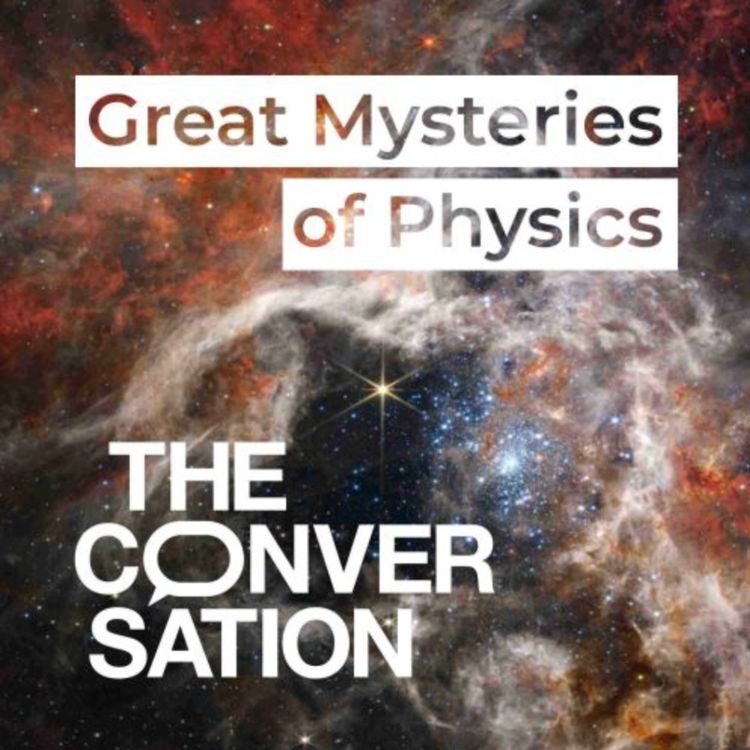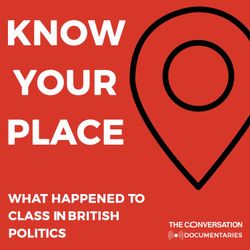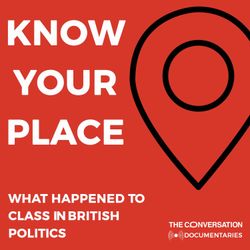Share

Know Your Place | The Conversation Documentaries
Is there a multiverse?
Interest in the multiverse theory, suggesting that our universe is just one of many, has spiked since the movie Everything Everywhere All At Once was released. The film follows Evelyn Wang on her journey to connect with versions of herself in parallel universes to stop the destruction of the multiverse. The multiverse idea has long been an inspiration for science fiction writers. But does it have any basis in science? And if so, is it a concept we could ever test experimentally?
Featuring Andrew Pontzen, professor of Cosmology at University College London, Katie Mack, Hawking chair in cosmology and science communication at the Perimeter Institute for Theoretical Physics, and Sabine Hossenfelder, research fellow of physics at the Frankfurt Institute for Advanced Studies.
This episode is presented by Miriam Frankel and produced by Hannah Fisher. Executive producers are Jo Adetunji and Gemma Ware. Social media and platform production by Alice Mason, sound design by Eloise Stevens and music by Neeta Sarl. A transcript is available here. Sign up here for a free daily newsletter from The Conversation.
Further reading:
More episodes
View all episodes

Know Your Place part 5: the real class divide
31:15|The neglect of working-class voters in the past few decades has had profound consequences for British political life. Disillusioned with the two main parties, many have turned to Nigel Farage’s Reform and others are simply not voting at all. With the next election likely to be a tight race in many key constituencies, something must be done to win these voters back.But as we find out in this fifth and final part of Know Your Place: what happened to class in British politics, the relationship between class and voting could be about to become even more complicated. So it’s difficult for any party to know how to put an electoral coalition together. Featuring, Geoffrey Evans, professor in the sociology of politics at the University of Oxford, John Curtice, senior research fellow at the National Centre for Social Research, Oliver Heath, professor of politics at Royal Holloway University of London, Paula Surridge, professor of political sociology at the University of Bristol, Rosie Campbell, director of the Global Institute for Women’s Leadership at King's College London and Vladimir Bortun, lecturer in politics at University of Oxford.The Conversation Documentaries, formerly The Anthill podcast, is home to in-depth audio series from The Conversation UK, a not-for-profit independent news organisation. Find out more and donate here. And consider signing up for Politics Weekly, an essential briefing on the big stories of the week from The Conversation UK's politics and society team.Further reading: The true class divide in British politics is not which party people choose, but whether they vote at allWhy the Tories may be wasting their time trying to compete with ReformClass identity: why fancy freebies are a bigger political problem for this Labour government than its Tory predecessors
Know Your Place part 4: a working class parliament?
28:53|After the 2024 election, the British parliament looks very different, with a large Labour majority for the first time in more than a decade. Several cabinet ministers come from working-class backgrounds, including the prime minister, deputy prime minister and foreign secretary. What impact will the upbringing of this new parliament have on the way Britain is governed?In the fourth part of Know Your Place: what happened to class in British politics, we examine the link between representation and political change and ask will Britain's new look parliament herald meaningful reform?Featuring Rosie Campbell, director of the Global Institute for Women’s Leadership and professor of politics at King's College London, Vladimir Bortun, lecturer in politics at the University of Oxford, former Labour MP David Hanson, now Baron Hanson of Flint and current Labour MP Jeevun Sandher.The Conversation Documentaries, formerly The Anthill podcast, is home to in-depth audio series from The Conversation UK, a not-for-profit independent news organisation. Find out more and donate here. And consider signing up for Politics Weekly, an essential briefing on the big stories of the week from The Conversation UK's politics and society team.Further reading: Can Kemi Badenoch claim to have ‘become working class’ while working in McDonald’s – and why would she want to?Beyond ‘my dad was a toolmaker’: interviews with former politicians reveal what it’s really like to be working class in parliament Class identity: why fancy freebies are a bigger political problem for this Labour government than its Tory predecessors
Know Your place part 3: what class means now
34:14|In the third part of Know Your Place: what happened to class in British politics, we explore how class is defined and measured, and how the UK’s changing class identity interacts with identity politics. Featuring Daniel Evans, lecturer in criminology, sociology and social policy at Swansea University, Gillian Prior, deputy chief executive of the National Centre for Social Research, John Curtice, senior research fellow at the National Centre for Social Research, Oliver Heath, professor of politics at Royal Holloway University of London, Paula Surridge, professor of political sociology at the University of Bristol and Tim Bale, professor of politics at Queen Mary University of London.Know your place is a series supported by the National Centre for Social Research. It's produced and mixed by Anouk Millet for The Conversation. Full credits available here.The Conversation Documentaries, formerly The Anthill podcast, is home to in-depth audio series from The Conversation UK, a not-for-profit independent news organisation. Find out more and donate here. And consider signing up for Politics Weekly, an essential briefing on the big stories of the week from The Conversation UK's politics and society team.Further reading: Can Kemi Badenoch claim to have ‘become working class’ while working in McDonald’s – and why would she want to?Deliveroo judgment shows how gig economy platforms and courts are eroding workers’ rightsAge, not class, is now the biggest divide in British politics, new research confirms
Know Your Place part 2: a history of class politics
31:56|In the second episode of Know Your Place: what happened to class in British politics, host Laura Hood, senior politics editor at The Conversation, looks back at a century of class in British politics to understand why Tony Blair's decision to move Labour away from the working class was such a watershed moment. Featuring Mark Garnett, senior lecturer in politics at Lancaster University, Martin Farr, senior lecturer in contemporary British history at Newcastle University and Tim Bale, professor of politics at Queen Mary University of London. Plus interviews with former Labour MPs Reg Race and David Hanson, who is now a member of the House of Lords and minister of state for the Home Office.Know your place is a series supported by the National Centre for Social Research. It's produced and mixed by Anouk Millet for The Conversation. Full credits available here.The Conversation Documentaries, formerly The Anthill podcast, is home to in-depth audio series from The Conversation UK, a not-for-profit independent news organisation. Find out more and donate here. And consider signing up for our free daily newsletter.Further readingCan Kemi Badenoch claim to have ‘become working class’ while working in McDonald’s – and why would she want to?Age, not class, is now the biggest divide in British politics, new research confirmsThatcher helped people to buy their own homes – but the poorest paid the price
Know Your Place part 1: the class shift
31:22|In the first episode of our new podcast series Know Your Place: what happened to class in British politics, host Laura Hood, senior politics editor at The Conversation, explores when the relationship between class and voting broke down and why. Featuring John Curtice, professor of politics at the University of Strathclyde and senior research fellow at the National Centre for Social Research, Paula Surridge, professor of political sociology at the University of Bristol, Tim Bale, professor of politics at Queen Mary University of London and Geoffrey Evans, professor in the sociology of politics at the University of Oxford. Know your place is a series supported by the National Centre for Social Research. It's produced and mixed by Anouk Millet for The Conversation. Full credits available here. The Conversation Documentaries, formerly The Anthill podcast, is home to in-depth audio series from The Conversation UK, a not-for-profit independent news organisation. Find out more and donate here. And consider signing up for our free daily newsletter. Further readingAge, not class, is now the biggest divide in British politics, new research confirmsBrexit identities: how Leave versus Remain replaced Conservative versus Labour affiliations of British votersUK election: Reform and Green members campaigned more online – but pounded the pavements less
Know your place: what happened to class in British politics – trailer
02:50|The relationship between class and political preference in Britain used to be clear cut – Labour for the working class, the Conservatives for the middle class. But not any more. In a new five-part series, Know your place: what happened to class in British politics, Laura Hood, senior politics editor at The Conversation, explores what fractured the relationship between class and voting in the UK, and why no politicians can take the working class vote for granted. The first episode launches on October 7.Know your place is a series supported by the National Centre for Social Research. It's produced and mixed by Anouk Millet for The Conversation. The Conversation Documentaries, formerly The Anthill podcast, is home to in-depth audio series from The Conversation, a not-for-profit independent news organisation. Find out more and donate here.
An update and a name change
01:13|We’re changing our name, from The Anthill, to The Conversation Documentaries! Over the last few years we’ve used The Anthill podcast to run in-depth series on a range of issues. And that’s exactly what we’ll keep on doing. But we’re changing our name to better reflect that what you’re listening to are documentaries from The Conversation. We’re a not-for-profit independent news website and our editors work with academics to help share their expertise and research with as many people as possible.In the next few weeks we’ll be launching a new limited series about British politics. So keep following The Conversation Documentaries, and watch this space for our latest trailer, coming soon.
Theory of everything: do we really need one?
56:29|The quest for a theory of everything – explaining all the forces and particles in the universe – is arguably the holy grail of physics. While each of our main theories of physics works extraordinarily well, they also clash with each other. But do we really need a theory of everything? And are we anywhere near achieving one?Featuring Vlatko Vedral, a professor of physics at the University of Oxford and Chanda Prescod-Weinstein, an assistant professor in physics and astronomy and core faculty in women's and gender studies at the University Of New Hampshire.This episode is presented by Miriam Frankel and produced by Hannah Fisher. Executive producers are Jo Adetunji and Gemma Ware. Social media and platform production by Alice Mason, sound design by Eloise Stevens and music by Neeta Sarl. A transcript is available here. Sign up here for a free daily newsletter from The Conversation.Further reading: The standard model of particle physics may be broken – an expert explains
Will we ever have a fundamental theory of life and consciousness?
46:45|What’s the difference between a living collection of matter, such as a tortoise, and an inanimate lump of it, such as a rock? They are, after all, both just made up of non-living atoms. The truth is, we don’t really know yet. Life seems to just somehow emerge from non-living parts.Featuring Jim Al-Khalili, professor of physics at the University of Surrey, and Sara Imari Walker, professor of physics at Arizona State University.This episode is presented by Miriam Frankel and produced by Hannah Fisher. Executive producers are Jo Adetunji and Gemma Ware. Social media and platform production by Alice Mason, sound design by Eloise Stevens and music by Neeta Sarl. A transcript is available here. Sign up here for a free daily newsletter from The Conversation.Further reading: Life: modern physics can’t explain it – but our new theory, which says time is fundamental, might